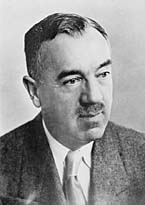John Tipton Lonsdale (1895-1960)
 Dr. John Tipton Lonsdale died of a heart attack in his home in Austin, Texas, October 5, 1960, at the age of 64. He had been Director of the Bureau of Economic Geology and Professor of Geology at UT-Austin for 15 years and was active on the campus up to two days before his death.
Dr. John Tipton Lonsdale died of a heart attack in his home in Austin, Texas, October 5, 1960, at the age of 64. He had been Director of the Bureau of Economic Geology and Professor of Geology at UT-Austin for 15 years and was active on the campus up to two days before his death.
Lonsdale was born at Dale, Iowa, November 8, 1895. He was awarded the BA degree in 1917, the MS degree in 1921, both from the University of Iowa, and the PhD degree in 1924 from the University of Virginia.
His distinguished professional career began in 1921 as Assistant Professor of Geology at the University of Virginia and geologist for the Virginia Geological Society. In 1924 he became Assistant Professor of Geology at the University of Oklahoma and Geologist for the Oklahoma Geological Survey, and in 1925 he came to UT as a Geologist in the Bureau of Economic Geology. In 1928 he became Professor of Geology and Head of the Department of Geology, Texas A & M at College Station, Texas. He was the leader in developing a strong geology curriculum at Texas A & M and was chiefly responsible for the planning and design of a new geology building on that campus. While at College Station he was Geologist for the Missouri Pacific Railroad. From Texas he went to the Iowa State College at Ames where, except for military leave, he stayed from 1935 to 1945 as Professor of Geology and Head of the Department of Geology. He returned to Austin in 1945 to rejoin UT as Director of the Bureau of Economic Geology and Professor of Geology.
Among the important tasks assigned to him by University officials shortly after returning to UT in 1945 was to aid in the recruiting and building of an outstanding Department of Geology. He served on the Department’s Budget Council during those difficult years, and his counsel and guidance had a marked effect on the Department’s growth.
Following service in the United States Army as lieutenant from 1917-19, wherein he was cited for bravery, Dr. Lonsdale was active as a reserve officer between World Wars I and II. He served in the Army again from 1942 to 1945 as Lieutenant Colonel and Colonel and continued his interest in reserve activities even while holding the rank of a retired officer.
Dr. Lonsdale was a member of a long list of scientific and honorary societies including Sigma Xi, American Association of Petroleum Geologists, American Institute of Mining, Metallurgical, and Petroleum Engineers, American Geophysical Union, Society of Economic Paleontologists and Mineralogists. He was a Fellow of the Geological Society of America, the Mineralogical Society of America, and the American Association for the Advancement of Science. He served his professional societies faithfully by working on various committees such as Committee for Stratigraphic Nomenclature of the American States Geologists, the Research, Business and Well Sample Committees of the American Associations of Petroleum Geologists, the Committee for Nomination of Fellows of the Mineralogical Society of America, and the Policy and Administrative Committee of The Geological Society of America. He served on various professional committees including the Texas Topographic Mapping Advisory Committee, Mapping Committee of the Texas Water Conservation Association, Geology and Minerals Committee of the Arkansas and Red River Interagency Committee, and Texas Advisory Committee on Conservation Education.
John Lonsdale’s contributions to geologic research ranged from detailed analyses of complex rock and mineral systems to the economic geology of many different industrial mineral products. Among his specialties were investigations of ground water resources and the general geology of the Big Ben National Park. During his years as Director of the Bureau of Economic Geology, he began a program of investigation of the State’s mineral resources, concentrating on minerals rather than oil and gas.
Dr. Lonsdale had a way of developing a strong bond with his students that endured long after they left the classroom. Many of these students have risen to high places in the scientific and business world. Because of their deep affection and esteem for him, they continued to visit and correspond with Lonsdale through the years and up to the time of his death. Many came hundreds of miles to pay their last respect and many have written sincere tributes to his influence through the years.